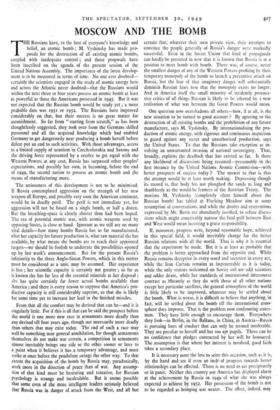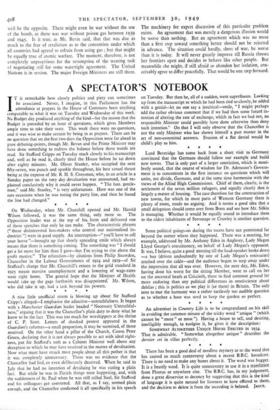MOSCOW AND THE BOMB
T. HE Russians have, to the best of everyone's knowledge and belief, an atomic bomb ; M. Vyshinsky has made pro- posals for the destruction of all existing atomic bombs, coupled with inadequate control ; and those proposals have been inscribed on the agenda of the present session of the United Nations Assembly. The importance of the latest develop- ment is to be measured in terms of time. No one ever doubted— certainly the scientists engaged in the study of atomic energy here and across the Atlantic never doubted--that the Russians would within the next three or four years possess an atomic bomb at least as powerful as those the Americans possessed in 1945. But it was not expected that the Russian bomb would be ready yet ; a more probable date was 1951 or 1952. The Russians have improved considerably on that, but their success is no great matter for astonishment. So far from " starting from scratch," as has been thoughtlessly suggested, they took over from the Germans skilled personnel and all the acquired knowledge which had enabled Germany to get dangerously near producing a bomb herself before defeat put an end to such activities. With those advantages, access to a limited supply of uranium in Czechoslovakia and Saxony and the driving force represented by a resolve to get equal with the Western Powers at any cost, Russia has surpassed other peoples' expectations, and possibly her own, in becoming, before the end of 1949, the second nation to possess an atomic bomb and the means of manufacturing more.
The seriousness of this development is not to be minimised. If Russia contemplated aggression on the strength of her new weapon all Europe, and possibly very soon the American continent, would be in deadly peril. The peril is not immediate yet, for aggression will not be based on a single bomb, or half a dozen. But the breathing-space is clearly shorter than had been hoped. The era of potential atomic war, with atomic weapons used by opposing forces, is close at hand. Ignorant as we still are on many vital details—how many bombs Russia has so far manufactured, what her capacity for future production is, what raw material she has available, by what means the bombs are to reach their appointed targets—we should be foolish to underrate the possibilities opened up by last week's announcement. But for the present Russia's inferiority to the three Anglo-Saxon Powers, which in this matter must be considered as a unit, may be assumed. Her experience is less ; her scientific capacity is certainly not greater ; so far as is known she has far less of the essential minerals at her disposal ; she has quite certainly far fewer actual bombs available than America ; and there is every reason to suppose that America's pro- ductive capacity is still considerably superior, so that she is likely for some time yet to increase her lead in the finished missiles.
From that all the comfort may be derived that can be—and it is singularly little. For if this is all that can be said the prospect before the world is one more new race in armaments more deadly than any devised till four years ago, though not necessarily more deadly than others that may exist today. The end of such a race may well be something near general annihilation, for though armaments themselves do not make war certain, a competition in armaments almost inevitably brings one side or the other sooner or later to a point when it believes it has a temporary advantage, and must strike at once before the pendulum swings the other way. To that extent the acquisition of the bomb by Russia may, paradoxically, work more in the direction of peace than of war. Any assump- tion of that kind must be hesitating and tentative, for Russian psychology is strange and incalculable. But it seems possible that some even of the more intelligent leaders seriously believed that Russia was in danger of attack from the West, and all but certain that, whatever their own private view, their attempts to convince the people generally of Russia's danger were markedly successful. Even in the Soviet Union that kind of propaganda can hardly be persisted in now that it is known that Russia is in a position to meet bomb with bomb. There was, of course, never the smallest danger of any of the Western Powers profiting by their temporary monopoly of the bomb to launch a preventive attack on Russia, but the fear of that imaginary danger will substantially diminish Russian fears now that the monopoly exists no longer. And in America itself the small minority of stridently provoca- tive critics of all things Russian is likely to be sobered by a new realisation of what war between the Great Powers would mean.
One question now overshadows all others—how, if at all, is the new situation to be turned to good account ? By agreeing to the destruction of all existing bombs and the prohibition of any future manufacture, says M. Vyshinsky. By internationalising the pro- duction of atomic energy, with rigorous and continuous inspection to guard against any secret and unauthorised production, says the United States. To that the Russians take exception as in- volving an unwarranted invasion of national sovereignty. That, broadly, explains the deadlock that has existed so far. Is there any likelihood of discussions being resumed—presumably in the first instance by the United Nations Atomic Commission—with better prospects of success today ? The answer to that is that the attempt would be at least worth making. Depressing though its record is, that body has not ploughed the sands as long and thanklessly as the would-be framers of the Austrian Treaty. The motions M. Vyshinsky (completely silent himself about the Russian bomb) has tabled at Flushing Meadow aim at some resumption of conversations, and while the doubts and reservations expressed by Mr. Bevin are abundantly justified, to refuse discus- sions which might conceivably narrow the fatal gulf between East . and West would mean incurring a grave responsibility.
If, moreover, progress were, beyond reasonable hope, achieved in this special field, it would inevitably change for the better Russian relations with all the world. That is why it is essential that the experiment be made. But it is at least as probable that the problem is better approached from the opposite end. While Russia remains deceptive in every word and secretive in every act, while the Iron Curtain remains as impenetrable as it is today, while the only visitors welcomed on Soviet soil are odd scientists and odder deans, while her standards of international intercourse contrast as blatantly as they do with those of all other nations except her particular satellites, the general atmosphere of the world is little likely to be improved, whatever may be settled about the bomb. What is worse, it is difficult to believe that anything, in fact, will be settled about the bomb till the international atmo- sphere does improve. That is the problem now confronting states- men. They have little enough to encourage them. Everywhere they look—in Berlin, in the Balkans, in China, in Austria—Russia is pursuing lines of conduct that can only be termed intolerable. They are peculiar to herself and her too apt pupils. There can be no confidence that pledges contracted by her will be honoured. The assumption is that where her interest is involved, good faith takes a secondary place.
It is necessary none the less to seize this occasion, such as it is, by the hand and see if even an inch' of progress towards better relationships can be effected. There is no need to act precipitately or in panic. Neither this country nor America has displayed alarm at the achievement by Russia in 1949 of what she was always expected to achieve by 1952. Her possession of the bomb is not to be regarded as bringing war nearer. The effect, indeed, may well be the opposite. There might even be war without the use cf the bomb, as there was war without poison gas between 1939 and 1945. Is it true, as Mr. Bcvin said, that that was due as much to the fear of retaliation as to the convention under which all countries had agreed to refrain from using gas ; but that might be equally true of atomic warfare. The moment, therefore, is not completely unpropitious for the resumption of the wearing task cf negotiating still for some watertight agreement. The United Nations is in session. The major Foreign Ministers are still there. The machinery for expert discussion of this particular problem exists. An agreement that was merely a dangerous illusion would be worse than nothing. But an agreement which was no more than a first step toward something better should not be rejected in advance. The situation could hardly, short of war, be worse than it is today. It will never greatly improve till Russia throws her frontiers open and decides to behave like other people. But meanwhile she might, if still afraid to abandon her isolation, con- ceivably agree to differ peacefully. That would be one step forward.















































 Previous page
Previous page